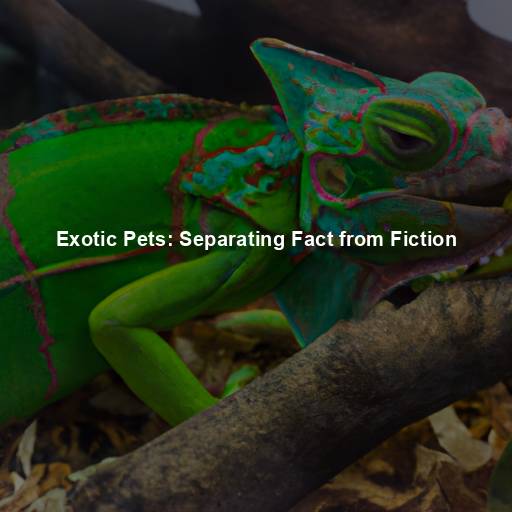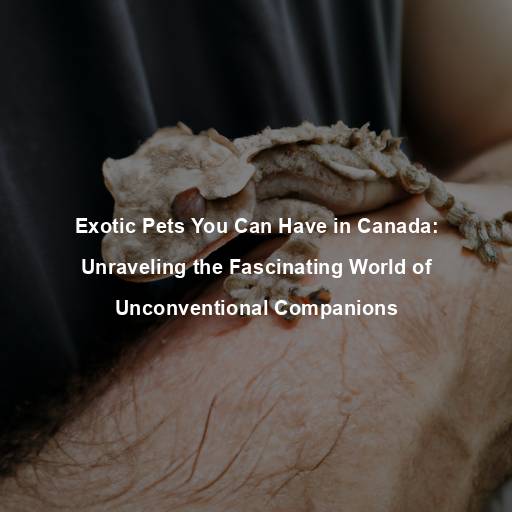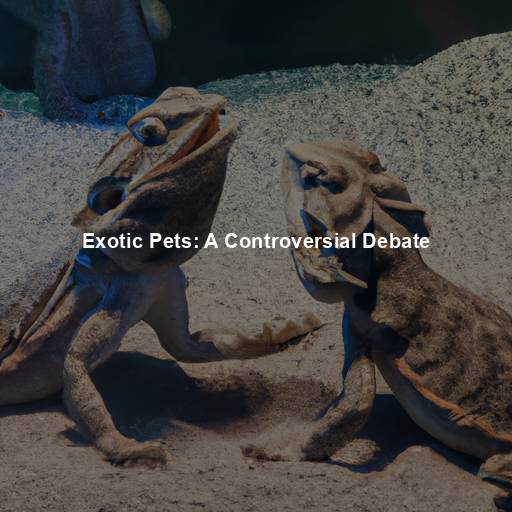Can You Have Exotic Pets in Florida?
Last Updated on November 13, 2023 by Evan
Contents [hide]
- 1 Exploring the Fascinating World of Exotic Pets
- 1.1 Understanding Florida’s Laws and Regulations
- 1.2 The Exotic Pet Trade
- 1.3 Florida’s Unique Biodiversity
- 1.4 Florida’s Laws on Exotic Pet Ownership
- 1.5 Restricted Species
- 1.6 Obtaining Permits
- 1.7 Responsible Ownership and Ethical Considerations
- 1.8 Public Safety Concerns
- 1.9 The Importance of Education and Advocacy
- 1.10 Environmental Concerns
- 1.11 Ethical Considerations
- 1.12 Public Safety Risks
- 2 Navigating the Legal Landscape
- 3 The Role of Education and Advocacy
- 4 FAQs – Can You Have Exotic Pets in Florida?
- 4.1 Is it legal to have exotic pets in Florida?
- 4.2 What are considered exotic pets in Florida?
- 4.3 Are there any exotic animals that are prohibited as pets in Florida?
- 4.4 What permits are required to own exotic pets in Florida?
- 4.5 Are there any special requirements or restrictions for owning exotic pets in Florida?
- 4.6 Can I release an exotic pet into the wild in Florida if I can no longer care for it?
- 4.7 How can I learn more about owning exotic pets in Florida?
Exploring the Fascinating World of Exotic Pets
Understanding Florida’s Laws and Regulations
When it comes to Florida, the land of sunshine and wild wonders, it’s no surprise that exotic pets have captured the hearts of many. However, before embarking on the adventure of owning one, it’s crucial to unravel the bewildering tapestry of laws and regulations that surround this unique realm. In this enchanting article, we’ll take a deep dive into the captivating world of exotic pet ownership in the Sunshine State, shedding light on the legal framework that governs it, the magnificent creatures that are permitted, and the array of responsibilities that accompany such a whimsical companionship. Get ready to unveil the puzzling secrets that lie within the realm of exotic pets in Florida.
The Exotic Pet Trade
Exotic pets, also known as non-native species, are animals that are not commonly found in domestic settings. These can include reptiles, birds, mammals, and even insects. The exotic pet trade is a thriving industry worldwide, catering to individuals who desire the companionship of something out of the ordinary. However, this trade comes with its fair share of challenges and controversies, especially concerning the well-being of the animals involved and the potential risks they pose to the environment.
Florida’s Unique Biodiversity
Unveiling the enigma of Florida’s natural wonders, where sprawling wetlands harmoniously coexist with lush subtropical forests and teem with life, mesmerizes even the most intrepid explorers. Within this captivating tapestry, a diverse array of wildlife, from the formidable alligators to the gentle manatees and the myriad bird species, finds solace. Yet, lurking in the shadows, a perplexing dilemma emerges – the introduction of non-native species that could unhinge these intricate ecosystems, potentially unleashing a cataclysmic cascade effect on the native flora and fauna. To safeguard the delicate balance of its intrinsic biodiversity, Florida stands resolute with stringent regulations, a testament to its commitment in warding off the looming threat posed by exotic pets.
Florida’s Laws on Exotic Pet Ownership
Florida takes its responsibility towards its environment and public safety very seriously, leading to the establishment of strict laws and regulations pertaining to exotic pet ownership. The Florida Fish and Wildlife Conservation Commission (FWC) has been entrusted with the pivotal task of governing and ensuring compliance with these regulations. As a measure to promote transparency, the FWC maintains an extensive catalog of restricted species that clearly delineates which animals are strictly prohibited or necessitate specific permits for ownership.
Restricted Species
Florida’s list of restricted species includes a wide range of animals, from large carnivores like tigers and lions to certain reptiles, primates, and venomous snakes. Owning these animals without the required permits can result in serious consequences, including fines and the confiscation of the animals. It is crucial for potential exotic pet owners to familiarize themselves with this list and understand the specific requirements for each species.
Obtaining Permits
The captivating world of exotic pets in Florida is as enigmatic as it is alluring. From the forbidden to the permitted, navigating the intricacies of creature ownership becomes a dance of laws and obligations. To be the proud caretaker of a restricted species, one must embark on a perplexing journey of permits, a labyrinthine path that demands extensive know-how, commendable housing, diligent care, and even the acquisition of liability insurance. Brace yourself, as the enigmatic FWC may even grace your doorstep for unexpected inspections, leaving no room for complacency.
Responsible Ownership and Ethical Considerations
Having an exotic pet can be a thrilling and alluring prospect, but it’s a venture that comes with a hefty dose of responsibility. These captivating creatures require a level of care and attention that surpasses that of your typical household companions. It’s imperative for aspiring owners to delve into extensive research to grasp the intricacies of their unique dietary needs, living conditions, and overall well-being. Furthermore, ethical dilemmas concerning the breeding and procurement of these extraordinary animals should constantly be at the forefront of prospective pet owners’ minds.
Public Safety Concerns
Apart from the potential impact on the environment, public safety is another important factor to consider when it comes to owning exotic pets. While many exotic pet owners are responsible individuals who provide proper care for their animals, incidents involving escaped or mistreated exotic pets have occurred in the past. These incidents can pose risks to both the public and the animals themselves. It is crucial for owners to take necessary precautions to prevent such events and ensure the safety of their pets and the community.
The Importance of Education and Advocacy
As the debate surrounding exotic pet ownership continues, education and advocacy play a vital role in fostering responsible ownership and minimizing the negative impact on both the animals and the environment. Organizations and individuals dedicated to exotic pet welfare work tirelessly to raise awareness about the challenges associated with the exotic pet trade and promote responsible ownership practices. By supporting these efforts and staying informed, individuals can contribute to the well-being of exotic animals and their ecosystems.
Environmental Concerns
Picture yourself in the midst of a tantalizing debate: the introduction of non-native species into delicate ecosystems. Brace yourself for a whirlwind of consequences, my dear readers. Can you believe it? Those exotic pets, oh so innocent and adorable, may actually unleash chaos upon our native wildlife populations.
Ethical Considerations
In a world filled with fascinating creatures, the allure of exotic pets can be hard to resist. But beneath the surface lies a web of ethical quandaries, their tendrils reaching far and wide. The pet trade, fueled by a hunger for the unique and the extraordinary, often comes at a cost – a cost paid in tears shed by a multitude of wild animals torn from their natural habitats. The consequence is clear: depleted populations and the dark underbelly of illegal wildlife trafficking.
Public Safety Risks
Keeping exotic pets can be a fascinating but challenging endeavor. While many responsible owners successfully care for these unique creatures, there have unfortunately been instances where circumstances took a dangerous turn. Escapes or mistreatment of these animals can lead to potential risks to public safety, creating a perplexing situation for everyone involved. It is of utmost importance for exotic pet owners to prioritize safety measures, such as secure enclosures and responsible handling, to prevent any mishaps and ensure the safety and well-being of their pets and the community as a whole.
Understanding Florida’s Restricted Species List
Discover the enigmatic world of Florida’s restricted species list, an intricate compendium that unveils the astonishing array of animals that demand a special permit or are unequivocally prohibited from being owned. From beguiling reptiles to captivating primates, majestic large cats to intriguing venomous snakes, and an assortment of other exotic species, this list serves as an indispensable manual for aspiring exotic pet owners. Immerse yourself in its bewildering intricacies to fully comprehend the unique requisites and restrictions tied to each enthralling creature. Remember, the law spares no mercy for those who remain uninformed, and the consequences of non-compliance can be nothing short of profound.
Applying for Permits and Licenses
Owning a rare and exotic creature may be a desire that piques the curiosity of many, but navigating the labyrinth of permits and licenses is no easy feat. One must prove their expertise and demonstrate adequate understanding of proper animal care, not to mention the inconspicuous matter of acquiring liability insurance. To add to the perplexity, each species comes with its own unique set of permit requirements, turning the application process into a convoluted and time-consuming endeavor. It is of utmost importance to delve into the depths of research and comprehend the intricate regulations, seeking the guiding light of the Florida Fish and Wildlife Conservation Commission (FWC) to ensure a smooth path to compliance.
Responsible Pet Ownership Requirements
Beyond legal obligations, responsible exotic pet ownership requires a commitment to meeting the unique needs of these animals. Exotic pets often have specialized dietary, housing, and environmental requirements that must be met for their well-being. It is crucial for potential owners to thoroughly research and understand these needs before bringing an exotic pet into their home. Providing proper care, enrichment, and veterinary attention are essential elements of responsible ownership.
Supporting Conservation Efforts
While some individuals may be disappointed to learn that owning certain exotic pets is not feasible, there are alternative ways to support conservation efforts and appreciate these fascinating creatures. Zoos and wildlife sanctuaries play a crucial role in providing appropriate care for exotic animals while educating the public about their natural history and conservation needs. Supporting these institutions through visits, donations, or volunteering can contribute to the welfare and preservation of these species.
The Role of Education and Advocacy
Raising Awareness
In a world full of diverse and captivating creatures, it’s easy to see why the allure of owning an exotic pet can be tantalizing. However, it’s crucial that we recognize the importance of education and advocacy in order to ensure responsible ownership and protect our precious animal companions. By raising awareness about the often overlooked challenges and risks associated with the exotic pet trade, we can empower individuals to make informed choices that prioritize the wellbeing of both animals and the environment. Through various outreach programs, informational campaigns, and community engagement initiatives, we can navigate the perplexing world of exotic pets together, fostering a deeper understanding and appreciation for the intricate web of life that surrounds us.
Promoting Responsible Ownership
It is of utmost importance to shed light on the unique demands and obligations that come with owning exotic pets. Equipping individuals with comprehensive knowledge, support, and expert advice regarding appropriate care, interaction, and habitat creation is paramount in safeguarding the welfare of these animals and their caretakers. By advocating for responsible ownership practices, we can mitigate potential hazards to both the public and the ecosystem, while fostering meaningful and harmonious relationships between humans and their unconventional companions.
Collaboration and Legislation
In a world where the exotic pet industry poses a unique set of challenges, there is hope for change. Government agencies, alongside conservation organizations and animal welfare groups, can unite in a perplexing endeavor to craft legislation that tackles the perplexing issues surrounding exotic pet ownership. By bursting through barriers and collaborating on effective regulations, we can pave the way for a more sustainable and responsible industry. Let us not forget the importance of supporting enforcement efforts and promoting ethical sourcing and breeding practices, as we navigate this burst of potential.
FAQs – Can You Have Exotic Pets in Florida?
Is it legal to have exotic pets in Florida?
Owning exotic pets in Florida may seem like a tantalizing adventure, but it’s a world full of twists and turns. The Florida Fish and Wildlife Conservation Commission (FWC) dons its governing cape to regulate the possession and ownership of these unique creatures. However, don’t be fooled by the allure, for some exotic pets are deemed prohibited due to their potential to disrupt local wildlife harmony or put public safety at risk. So, if you’re looking to dive into the world of exotic pets in the Sunshine State, tread cautiously and navigate the perplexing labyrinth of regulations and permits.
What are considered exotic pets in Florida?
Florida, a land of sunshine and palm trees, is home to a bewildering array of exotic pets. From slithering snakes to colorful birds, these unique creatures have found their way into the hearts and homes of Floridians. Some of the fascinating species that can be legally owned with the right permits include pythons, boas, non-venomous snakes, turtles, macaws, parrots, wallabies, and even sugar gliders. However, it’s important to proceed with caution, for the ever-changing list of allowable species necessitates consulting the Florida Fish and Wildlife Conservation Commission (FWC) before bringing any extraordinary creature into one’s care.
Are there any exotic animals that are prohibited as pets in Florida?
Did you know that the sunny state of Florida has some strict rules when it comes to owning exotic pets? Brace yourself for this mind-boggling list of creatures that you would never imagine someone would keep as a pet! From majestic big cats like lions, tigers, and leopards, to intelligent primates like chimpanzees and gorillas, and even fearsome animals like Komodo dragons, alligators, and venomous snakes – it’s enough to make your head spin. These regulations might seem perplexing, but they are in place to protect both the public and the delicate balance of Florida’s unique ecosystem.
What permits are required to own exotic pets in Florida?
Navigating the realm of exotic pet ownership in Florida can be a perplexing quest, as the specific permits required vary depending on the species in question. Take the mighty pythons and boas, for instance – if they measure 2 inches or more in diameter, a Conditional Species Permit becomes the golden ticket. But hold your breath (or rather, watch out for venomous fangs), for those daring enough to entertain venomous reptiles, like certain serpents, the rules get even trickier with a Venomous Reptile Permit in demand. And let’s not forget the majestic Class I wildlife, encompassing formidable constrictor snakes and other potentially hazardous creatures, which command a Class I Permit. Tread carefully, dear readers, and be sure to embark on thorough research and acquisition of the appropriate permits from the FWC, so as to dance gracefully within the web of state regulations.
Are there any special requirements or restrictions for owning exotic pets in Florida?
Yes, there are specific requirements and restrictions for owning exotic pets in Florida. These can include proper caging, containment, and transportation protocols for the safety and well-being of the animals and the public. Owners must also adhere to regulations related to feeding, veterinary care, escape prevention, and record-keeping. Additionally, some species may require additional permits, such as those protected by the Convention on International Trade in Endangered Species (CITES). It is essential for exotic pet owners in Florida to be aware of and follow all applicable requirements and restrictions to ensure responsible ownership.
Can I release an exotic pet into the wild in Florida if I can no longer care for it?
Releasing exotic pets into the wild in Florida? Not a wise move. Apart from being illegal, it can wreak havoc on the delicate balance of the ecosystem. Picture this: non-native species duking it out with the locals for resources and possibly spreading diseases. If you find yourself unable to care for your exotic pet, take the responsible path and connect with a reputable exotic animal rescue or sanctuary. The Florida Fish and Wildlife Conservation Commission (FWC) is here to help you find the right place for your furry, feathery, or scaly companion, all while offering valuable guidance on pet ownership and disposal options.
How can I learn more about owning exotic pets in Florida?
To learn more about owning exotic pets in Florida, it is recommended to visit the Florida Fish and Wildlife Conservation Commission’s website at www.myfwc.com. The website provides comprehensive information regarding the laws, regulations, permits, and guidelines for owning exotic animals. Additionally, contacting the FWC directly through their helpline or regional offices allows individuals to obtain specific information tailored to their circumstances, ensuring accurate and up-to-date information on owning exotic pets in Florida.







